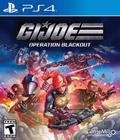The premise behind the G.I. Joe toy line from the 1980s seems like perfect material for a video game. An elite group of soldiers tasked with protecting the world from the actions of a terrorist organization named Cobra is perfect fodder for a typical run-and-gun shooter. Both the NES and the arcades did the line justice by doing just that, but G.I. Joe has been absent from consoles since then. The Rise of Cobra was based on the first live action movie that was released in 2009, but only the Nintendo DS version was moderately redeemable. At the tail end of the PS4 era, we're finally getting a G.I. Joe game based on the Classified toy line and subtitled Operation Blackout. If you were expecting something better than The Rise of Cobra, prepare for some disappointment.
The story doesn't feel out of place compared to the old animated series. Cobra's forces are once again aiming for world domination, and their plan starts with simultaneous attacks all over the world. The main target is the Joe's aircraft carrier, the U.S.S. Flagg. After successfully taking over the ship, they use its satellite system to jam every electronic device on the planet, rendering everything useless except for Cobra-sanctioned equipment. Down but not out, the remaining G.I. Joe forces regroup before leading an assault to take down Cobra and return things to normal.
The campaign mode takes place across 17 stages, and the gameplay features a third-person perspective, with the camera zooming in to an over-the-shoulder view when you aim. Your chosen character can carry up to two weapons at a time and some grenades, but you don't have a default firearm in your possession with infinite ammo, so your melee attack is invaluable. You have a special ability you can call on when a meter fills up, such as constructing an energy shield, creating a poison barrier, or throwing a grenade that explodes several times. Aping some of the mechanics from the Halo era of shooters, Operation Blackout features a regenerating shield, but you also have a separate health meter that is only replenished via health pick-ups.
There are two things that make Operation Blackout a little different from most shooters. When playing solo, you always have an AI partner by your side. They'll never die or use special abilities in a fight, but they provide you with an extra source of firepower. You can play as both Cobra and G.I. Joe forces throughout the campaign. In practice, it doesn't make that much of a difference since you're shooting up robots no matter which side you're on, but it's neat to be able to play as the villains.
The ability to shoot up robots in a variety of environments can make for a decent time, but this title commits the cardinal sin of making the shooting a terrible experience. Aiming is the main culprit, since it feels eternally sluggish. Even with the sensitivity cranked all the way up, you never feel like you can get a bead on the enemies, all of whom seem to move just fast enough to evade your crosshairs. There is an option for auto-aiming, but that seems to only last for a split second, so the option is nonexistent. If you managed to get a good aim on your foe, even the lowliest grunts take quite a bit of damage before blowing up. With most heroes having little ammo and few places to pick up guns or ammo, the experience feels quite limiting.
The awful shooting mechanics only emphasize the game's other shortcomings. The shortage of ammo means you'll rely on your melee attacks, but they feel weak here, so it doesn't feel worthwhile to make the effort to get close to the enemy to strike. Enemies have a tendency to spawn directly in front of you, although a few also appear behind you — committing another sin that most shooters try to avoid. They all seem to have impeccable aim despite the fact that they constantly strafe back and forth, making each firefight a legitimate challenge due to your handicaps.
That is amplified in boss battles, where the named characters tend to rush you spastically, so the fights become annoyances instead of exciting moments. Although the level design suggests that this can be compared to a cover-based shooter, especially with the abundance of waist-high cover in most levels, the title doesn't feature the snappy cover mechanics popularized by Gears of War, forcing you to employ more awkward means of taking cover to replenish your shields. Special abilities aren't helpful here, since every ability has a limited range.
You'd figure that having a persistent AI partner would shore up these shortcomings, but whether playing on the side of the Joes or Cobra, every ally you take with you into battle proves to be near brain-dead. They're all fond of running back and forth on the battlefield without necessarily drawing any attention to themselves, so you can never get any clean shots on the enemy. They are quite fond of getting in your way when you do take shots. They also rarely shoot back, and when they do, there's a very good chance that their shots will go wide. If it weren't for the fact that they can't die, they'd be a liability instead of actual help.
One thing that Operation Blackout can be praised for is the inclusion of multiplayer. The campaign can be played with one other player, which makes things easier since you have someone dependable who'll actually fight for you instead of against you. The one drawback is that vehicle control is split, with one person controlling movement and the other shooting, but it isn't that much of an issue since vehicular levels are few and far between. The game also has adversarial multiplayer modes for up to four players with typical modes like deathmatch, capture the flag, etc. The lack of an online multiplayer mode isn't that bad, since there's unlikely to be a thriving online community for this title, so the focus on local play is a boon, since there are so few shooter titles that offer this.
Graphically, the game is mostly a hit. The comic book style looks nice, especially since it blends in well with the cut scenes. The particle effects for explosions look robust, while the animations look good — until you catch characters moving their mouths minimally. The game also runs at a solid 30fps even on a PS4 Pro, which may not go over well with some people, since this doesn't feel like it's pushing the Unreal Engine that hard.
Sound-wise, the game is a miss. The music can be best described as generic and forgettable, and while it might have been cliché to have the old cartoon's theme playing every now and then, it would have gone a long way in getting you mildly excited for each stage. The use of laser fire is a good idea considering most people's familiarity with the cartoon that used them, but none of the effects carry any punch. The volume of almost every shot is drastically lowered, and the explosions and debris land on the ground almost silently. As for the voices, only a few of them sound fine for the characters, but most of them sound very off, either because they're too light for the character just don't have any emotion for their lines. Compared to the dialogue in many other licensed games, this isn't very good.
G.I. Joe: Operation Blackout is messy. The presentation is inconsistent, while the story is serviceable at best. The addition of local multiplayer outweighs the lack of online play, and the game is lengthy enough. However, the poor combat mechanics drag down the experience heavily, and on a platform that's absolutely bursting with more competent third-person shooters, this is one that you can easily pass on.
Score: 4.5/10
More articles about G.I. Joe: Operation Blackout











 G.I. Joe: Operation Blackout is a team-based, third-person shooter, letting you play as your favorite heroes and villains from Team Joe and Team Cobra.
G.I. Joe: Operation Blackout is a team-based, third-person shooter, letting you play as your favorite heroes and villains from Team Joe and Team Cobra.




